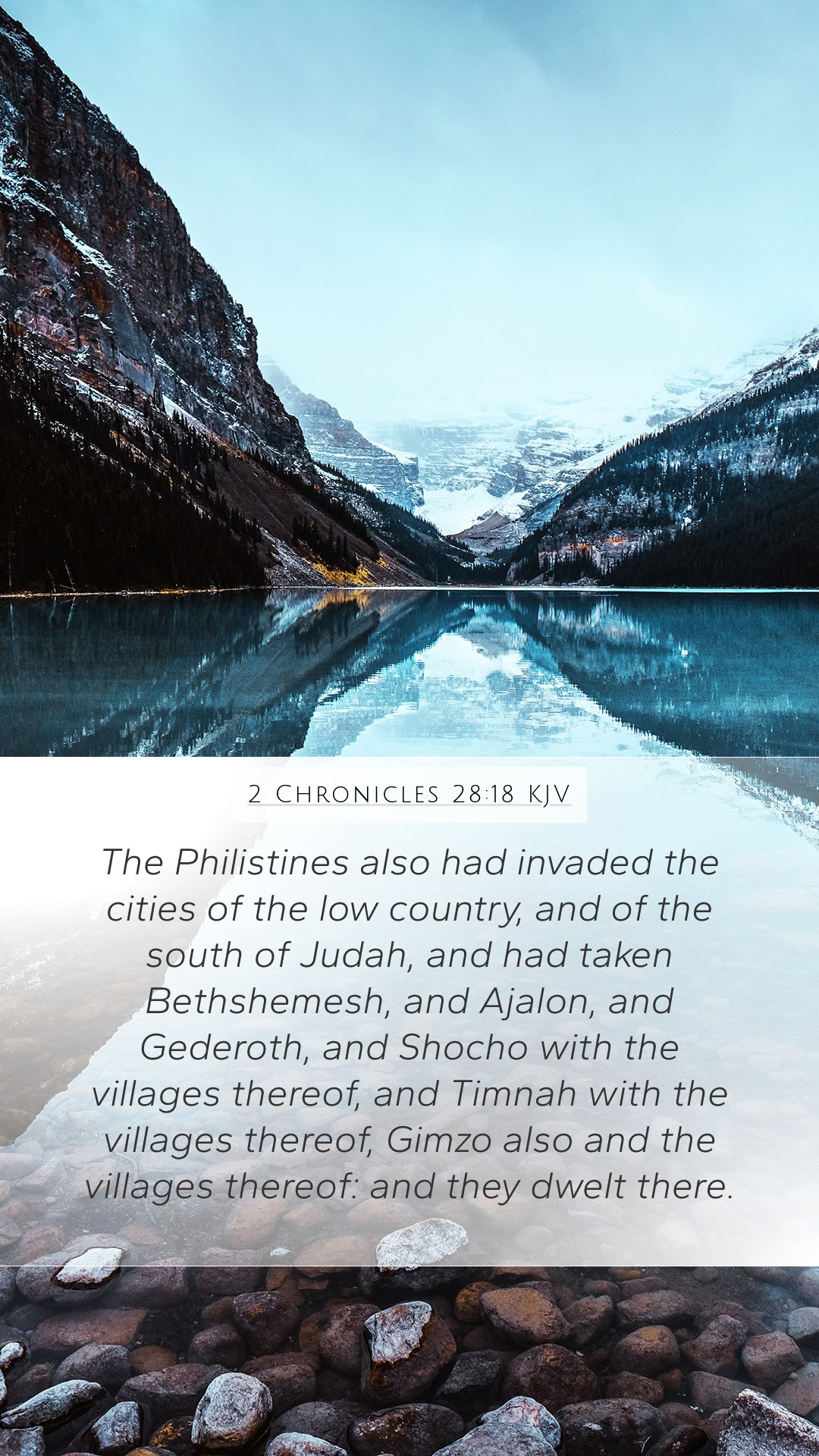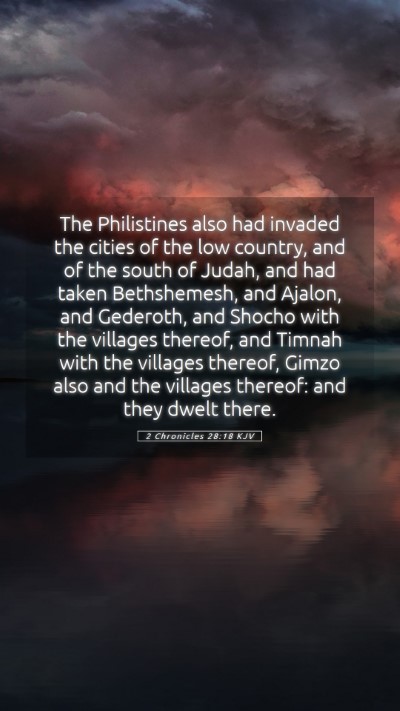Understanding 2 Chronicles 28:18: A Biblical Commentary
In this analysis, we delve into the meaning and interpretation of 2 Chronicles 28:18 through a combination of insights from renowned public domain commentaries including those by Matthew Henry, Albert Barnes, and Adam Clarke. This verse provides valuable lessons and insights for anyone seeking to deepen their Bible study and understanding of Scripture.
Text of the Verse
The verse reads: "The Philistines also had invaded the cities of the low country, and of the south of Judah, and had taken Beth-shemish, and Ajalon, and Gederoth, and Shocho, and Timnah, and Gimzo: they dwelt therein."
Meaning of the Verse
This verse describes a significant military incursion into the land of Judah by the Philistines. Here are the key components of its interpretation:
- Invasion and Conquest: The mention of the Philistines' invasion illustrates the ongoing conflict between Israel and its neighbors. This was a period of strife and tension in Judah, as external threats loomed large, significantly impacting the southern kingdom.
- Geographical Significance: The cities mentioned—Beth-shemish, Ajalon, Gederoth, Shocho, Timnah, and Gimzo—are strategically important, serving as gateways and strongholds. Their capture symbolizes not just a military defeat, but a spiritual and national crisis for Judah.
- Fulfillment of Prophecy: This event can also be viewed as a fulfillment of prophetic warnings given to Israel about the consequences of disobedience to God, where enemies would invade the land as divine judgment.
Commentary Insights
The following insights derive from prominent biblical commentators:
Matthew Henry's Commentary
Matthew Henry emphasizes the moral lessons drawn from Judah's defeat. He highlights that the invasion serves as a reminder of God’s displeasure due to Israel's deviation from His commandments. Henry remarks that the invasions and defeats are reflections of the nation’s spiritual state and their forsaking of true worship.
Albert Barnes' Notes on the Bible
Barnes focuses on the strategic implications of the Philistines' actions. He discusses how the capture of these cities played a role in shifting power dynamics in the region. Barnes further underscores the tension between Israel's reliance on foreign alliances versus their need to trust in God's protection.
Adam Clarke's Commentary
Clarke notes the historical significance of the Philistine advance and its repercussions for Judah’s sovereignty. He also highlights the importance of understanding the broader narrative of Israel’s history, framing this event in the context of their covenant relationship with God.
Related Bible Cross References
- 2 Chronicles 21:16-17: Discusses an earlier attack on Judah by the Philistines and others, indicating a pattern of military threats.
- Isaiah 9:12: Mentions the Philistines alongside other enemies as God’s instruments of judgment.
- Amos 1:8: Remarks on the judgments against the Philistines, reflecting the cyclical nature of conflict in the region.
Applying the Verse to Daily Life
This verse and its commentary insights provide profound lessons applicable to our lives today:
- Recognizing Spiritual States: Just as Judah faced consequences for its actions, we are encouraged to evaluate our spiritual lives and commitment to God.
- The Importance of Preparedness: The capture of cities serves as a reminder to be spiritually vigilant against encroaching influences.
- Value of God’s Protection: This conflict illustrates the necessity of relying on divine help in the face of challenges.
Conclusion
In summary, 2 Chronicles 28:18 serves as a critical insight into the historical conflicts faced by Judah while also providing timeless lessons about reliance on God's guidance and the consequences of turning away from His ways. Through various commentaries, we can glean a deeper understanding and apply these insights into our daily lives, enhancing our Bible study insights and furthering our Biblical exegesis.
For those engaged in Bible study groups or looking for online Bible study resources, this verse invites thoughtful discussion and deeper exploration of God's protective grace contrasted with human disobedience.


